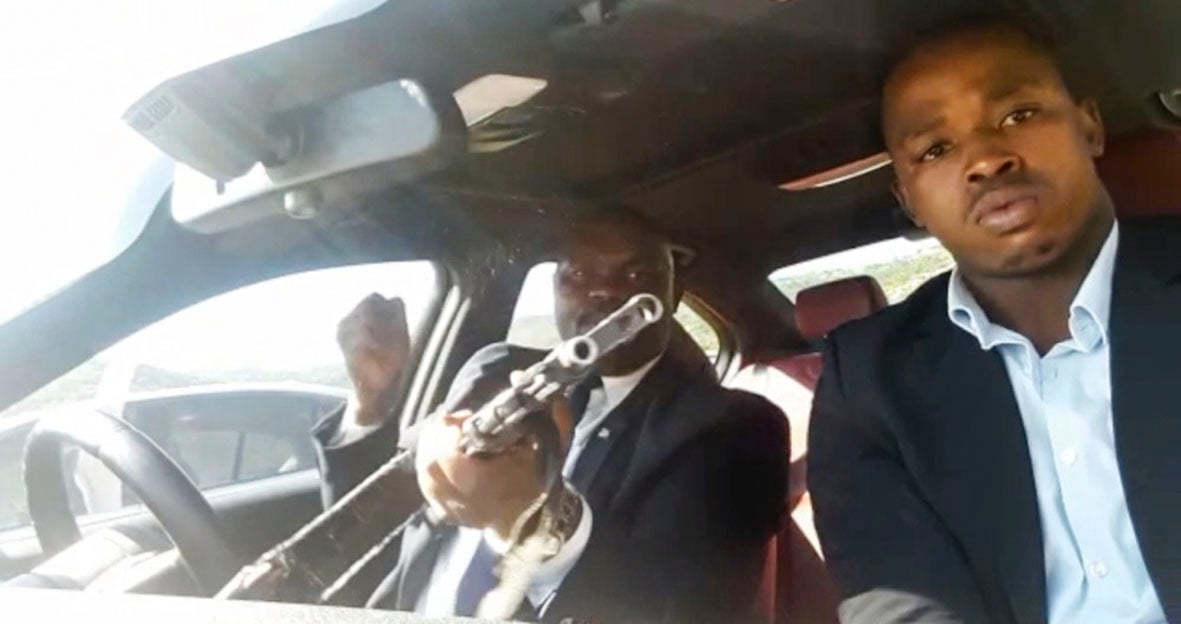KwaZulu-Natal leaders
There was a small army of bodyguards, all obviously carrying “material”, as it’s called in ANC circles, outside the Moerane commission on Thursday as the governing party’s KwaZulu-Natal leadership prepared to give evidence on the wave of political killings that has swept the province since 2012.
As provincial chairperson Sihle Zikalala and secretary Super Zuma walked into the department of public works conference centre, a gun-free zone according to the sign on the double doors, their tooled-up close protectors followed.
After the two took their seats, the minders went outside. There they joined the 20 or so members of the security detail for provincial executive committee members Mluleki Ndobe, Nomagugu Simelane-Zulu, Mdumiseni Ntuli and Vincent Madlala gathered around the entrance.
The bodyguards, and the increased police presence for the long-awaited appearance by the ANC leadership, are standard procedure for KwaZulu-Natal, where the spate of political murders since the 2011 local government elections has forced the appointment of the commission.
But the wall of steel that surrounds the leadership — even in nonthreatening situations — is indicative of just how dangerous political office in the province is. It’s also a reminder that the commission has not brought an end to the killings.
If anything, the paymasters behind the killings appear to have been emboldened, with the most high-profile murder ventilated at the commission — that of former ANC Youth League and uMzimkhulu councillor Sindiso Magaqa in July — taking place while it was in session.
Other rural municipalities, including Richmond and Camperdown, have not been spared either: sitting councillors have been gunned down since advocate Marumo Moerane SC and fellow commissioners Vasu Gounden and Cheryl Potgieter began their work in February, six months late.
Ironically, given the heightened security presence during the appearance of high-level politicians, the commission has heard story after story from ANC members and others about bodyguards allegedly being paid by rural municipalities to “take out” whistle-blowers or opponents of the dominant faction in the party at local level.
Their role has also been highlighted by the emergence of a video showing bodyguards of ANC eThekwini regional secretary Bheki Ntuli with an AK-47 threatening to “kill the dog”. The two guards, who were later arrested, were also responsible for guarding a North Coast mayor.

[A video still of armed bodyguards (Photo: Youtube)]
Last week, Magaqa’s friend Thabiso Zulu provided detailed testimony of how security companies employed by local councils falling under the Harry Gwala district municipality were allegedly used to settle political battles in southern KwaZulu-Natal.
This week, two councillors who were wounded along with Magaqa told the commission how a hit list of councillors who had been opposed to corruption in the municipality, including security contracts, were being systematically killed.
Jabulile Msiya said she had been aware that she was on the list along with Magaqa after the speaker of the Harry Gwala municipality, Khaya Thobela, was murdered. Magaqa, she said, had told her she would be “next”.
She said the council had not allocated them any protectors after the shooting, but that its officials were “quick” to provide themselves with security after Thobela’s killing, which took place in May, without a tender process being followed.
She said the councillors had requested protection, with even Premier Willies Mchunu backing their request, but had been told the matter had to go to tender.
“Even here, we came without any protection,” she said.
The disparity between protecting councillors and top office-bearers was also highlighted by the South African Local Government Association. Last month, the association’s representatives at the commission pointed to heavy red tape and a lack of co-ordination, saying the police were responsible for delays of up to six months in getting protection for councillors who were under threat.
Zikalala went on the offensive in his evidence-in-chief on Thursday, slamming opposition parties and ANC members who addressed the commission for opportunistic reasons and using it to score political points at the expense of the truth.
Zikalala said the ANC had inherited a violent society as a result of colonial and apartheid oppressors using violent means to quell popular revolt by Africans who had been dispossessed over two centuries.
“It should be clear that some of the issues that characterise our society today have evolved from the past,” he said.
The ANC had called for the appointment of the commission out of “grave concern” over the political killings, which affected it more than other parties because of its majority in government and its large support base, he said.
Zikalala challenged the narrative that the ANC was responsible for the killings, saying this was being exploited through “sheer opportunism” by the opposition and “former leaders of the ANC”.
“We are not here to respond but we will want to present our understanding,” Zikalala said, adding that others were participating in the commission to “find easy scapegoats”.
Tracing the history of state-sponsored violence against the ANC in the 1980s and 1990s in KwaZulu-Natal, Zikalala said many operatives had remained with the police and other agencies, and that this “touches on the possible failures within the police establishment to deal with some of the cases of violence we see today”.
“Are we safe to assume that the instigators of the violence, who worked for the apartheid state to destabilise South Africa, would be happy 23 years down the line?” he asked. “Are we to suppose that those who were useful agents of the apartheid apparatus, and were trained to fight the liberation movements, are to simply lie low and not find themselves relevant in some form or another?
“It is very clear to us that there are no short cuts or quick fixes to ending the violence,” Zikalala said. “The ANC believes that the institutionalised and deeply ingrained culture of violence in our society is at the core of these killings.”